Upcoming Events
|
Sat
13
DEC
|
7:00pm
|
 |
The Heights Theater
-
Houston
TX
Jack Ingram: Acoustic Holiday Tour with special guest Calder Allen
Jack Ingram, Calder Allen
|
|
Tue
16
DEC
|
7:00pm
|
 |
The Heights Theater
-
Houston
TX
The Moth Houston GrandSLAM
|
|
Fri
19
DEC
|
7:00pm
|
 |
The Heights Theater
-
Houston
TX
Home for the Holidays: Carolyn Wonderland, Shelley King, Rosie Flores, and Kevin Russell
Carolyn Wonderland, Shelley King, Rosie Flores, Kevin Russell
|
|
Tue
23
DEC
|
3:00pm
|
 |
The Heights Theater
-
Houston
TX
Will Hearn's Grand Ol' Christmas Show featuring Blue Water Highway and The Dirty River Jazz- MATINEE
The Dirty River Jazz Band, Blue Water Highway
|
|
Tue
23
DEC
|
7:00pm
|
 |
The Heights Theater
-
Houston
TX
Will Hearn's Grand Ol' Christmas Show featuring Blue Water Highway and The Dirty River Jazz Band
The Dirty River Jazz Band, Blue Water Highway
|
|
Wed
14
JAN
|
7:00pm
|
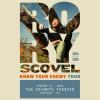 |
The Heights Theater
-
Houston
TX
Rory Scovel: Know Your Enemy Tour
Rory Scovel
|
|
Fri
16
JAN
|
7:00pm
|
 |
The Heights Theater
-
Houston
TX
James McMurtry with special guest BettySoo
James McMurtry, Bettysoo
|
|
Sat
17
JAN
|
7:00pm
|
 |
The Heights Theater
-
Houston
TX
Whitney Hanson - Words Never Die Tour 2026
Whitney Hanson
|
|
Wed
21
JAN
|
6:00pm
|
 |
The Heights Theater
-
Houston
TX
Spafford with special guest Bayou City Funk
Spafford, Bayou City Funk
|
|
Thu
22
JAN
|
7:00pm
|
 |
The Heights Theater
-
Houston
TX
Ruston Kelly – Pale, Through the Window Tour
Ruston Kelly, verygently
|
|
Fri
23
JAN
|
7:00pm
|
 |
The Heights Theater
-
Houston
TX
Ray Wylie Hubbard with special guest Dalton Domino
Ray Wylie Hubbard, Dalton Domino
|
|
Sat
24
JAN
|
7:00pm
|
 |
The Heights Theater
-
Houston
TX
An Evening with Al Di Meola
Al Di Meola
|
|
Sun
25
JAN
|
7:00pm
|
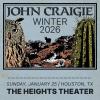 |
The Heights Theater
-
Houston
TX
John Craigie with special guest Olive Klug
John Craigie, Olive Klug
|
|
Sat
7
FEB
|
7:00pm
|
 |
The Heights Theater
-
Houston
TX
The Grammy Award-winning Rebirth Brass Band
Rebirth Brass Band
|
|
Tue
10
FEB
|
7:00pm
|
 |
The Heights Theater
-
Houston
TX
An Evening with Kathleen Edwards
Kathleen Edwards
|
|
Thu
12
FEB
|
7:00pm
|
 |
The Heights Theater
-
Houston
TX
An Evening with Bruce Hornsby
Bruce Hornsby
|
|
Fri
13
FEB
|
7:00pm
|
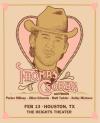 |
The Heights Theater
-
Houston
TX
Thomas Csorba with special guests Parker Millsap, Jillian Edwards, Matt Tedder, and Kelley Mickwee
Thomas Csorba, Parker Millsap, Jillian Edwards, Matt Tedder, Kelley Mickwee
|
|
Sat
14
FEB
|
7:00pm
|
 |
The Heights Theater
-
Houston
TX
Kat Edmonson - Only the Bare Essentials
Kat Edmonson
|
|
Sun
15
FEB
|
7:00pm
|
 |
The Heights Theater
-
Houston
TX
Sons of Cream
|
|
Tue
17
FEB
|
7:00pm
|
 |
White Oak Music Hall
-
Houston
TX
Stephen Wilson Jr. (rescheduled to WOMH on 2 / 17)
Stephen Wilson Jr.
|
|
Wed
18
FEB
|
7:00pm
|
 |
The Heights Theater
-
Houston
TX
Daniel Donato’s Cosmic Country
Daniel Donato
|
|
Tue
24
FEB
|
7:00pm
|
 |
The Heights Theater
-
Houston
TX
Warren Haynes Solo - Winter of Warren 2026
Warren Haynes
|
|
Sat
28
FEB
|
7:00pm
|
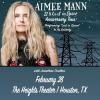 |
The Heights Theater
-
Houston
TX
Aimee Mann, 22 ½ Lost In Space Anniversary Tour with special guest Jonathan Coulton
Aimee Mann
|
|
Fri
6
MAR
|
7:00pm
|
 |
The Heights Theater
-
Houston
TX
The Jayhawks
|
|
Sat
7
MAR
|
7:00pm
|
 |
The Heights Theater
-
Houston
TX
Magic City Hippies with special guest Supertaste
Magic City Hippies, Supertaste
|
|
Thu
12
MAR
|
7:00pm
|
 |
The Heights Theater
-
Houston
TX
Corb Lund with special guest Branson Anderson
Corb Lund, Branson Anderson
|
|
Fri
13
MAR
|
7:00pm
|
 |
The Heights Theater
-
Houston
TX
Elise Trouw presents: The Diary of Elon Lust Tour
Elise Trouw, Damoyee
|
|
Fri
20
MAR
|
7:00pm
|
 |
The Heights Theater
-
Houston
TX
Bob Schneider
|
|
Sat
21
MAR
|
7:00pm
|
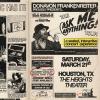 |
The Heights Theater
-
Houston
TX
Donavon Frankenreiter with special guests Hendrix Frankenreiter and The Sunday Spins
Donavon Frankenreiter, Hendrix Frankenreiter, The Sunday Spins
|
|
Thu
26
MAR
|
7:00pm
|
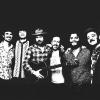 |
The Heights Theater
-
Houston
TX
The California Honeydrops - Shine Delights Tour 2026
The California Honeydrops
|
|
Sat
28
MAR
|
7:15pm
|
 |
The Heights Theater
-
Houston
TX
Backspace presents "Love Songs" benefiting Bel Inizio
Backspace
|
|
Thu
2
APR
|
7:00pm
|
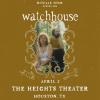 |
The Heights Theater
-
Houston
TX
Watchhouse
|
|
Thu
16
APR
|
7:00pm
|
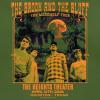 |
The Heights Theater
-
Houston
TX
The Brook & The Bluff
|
|
Fri
17
APR
|
7:00pm
|
 |
The Heights Theater
-
Houston
TX
Yonder Mountain String Band with special guest The Fretliners
Yonder Mountain String Band, The Fretliners
|
|
Sun
19
APR
|
7:00pm
|
 |
The Heights Theater
-
Houston
TX
An Evening with Colin Hay
Colin Hay
|
|
Thu
23
APR
|
6:00pm
|
 |
The Heights Theater
-
Houston
TX
Ballyhoo! and Bumpin Uglies
Bumpin Uglies, Ballyhoo!, The Supervillains
|
|
Fri
24
APR
|
7:00pm
|
 |
The Heights Theater
-
Houston
TX
The Band Of Heathens
|
|
Thu
30
APR
|
7:00pm
|
 |
The Heights Theater
-
Houston
TX
An Evening with Josh Ritter
Josh Ritter
|
|
Fri
1
MAY
|
7:00pm
|
 |
The Heights Theater
-
Houston
TX
Madam Radar and Paul McDonald
Paul Mcdonald, Madam Radar
|
|
Tue
12
MAY
|
6:30pm
|
 |
The Heights Theater
-
Houston
TX
moe. - Born to Fly Tour
moe.
|
|
Tue
16
JUN
|
7:00pm
|
 |
The Heights Theater
-
Houston
TX
Joe Jackson + Band - Hope and Fury Tour 2026
Joe Jackson
|
|
Sat
20
JUN
|
7:00pm
|
 |
The Heights Theater
-
Houston
TX
Troy Doherty
|





